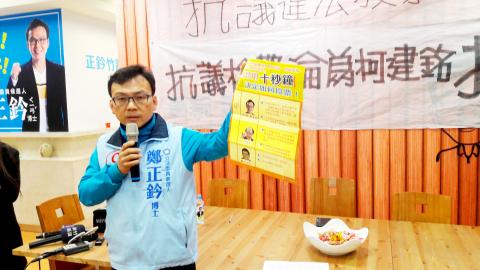Authorities said they have made persistent efforts to crack down on election-related criminal activity in recent weeks, and have handled more than 1,000 cases of suspected vote-buying, campaign violence, underground gambling on poll results and other election-related violations across the nation.
The Supreme Prosecutors’ Office yesterday said there have been reports of candidates resorting to illegal tactics by distributing smear campaign literature, along with vote-buying schemes in the run-up to Saturday’s presidential and legislative elections.
Prosecutor-General Yen Ta-ho (顏大和) said prosecutors and police are working to crack down on vote-buying and other violations, and that law enforcement agencies will promptly handle incidents of crowd violence.

Photo: Hung Mei-hsiu, Taipei Times
Supreme Prosecutors’ Office statistics indicated a total of 1,044 election violation cases, with charges against 1,797 suspects, as of Tuesday.
Among these, buying votes with cash or gifts by candidates accounted for 551 cases and 1,057 people charged, while election-related violence accounted for 69 cases and 83 suspects charged.
In their crackdown, authorities in Pingtung County raided 33 gambling operations yesterday and apprehended 27 people suspected of operating underground betting pools for wagering on election outcomes.

Photo: Liu Ching-hou, Taipei Times
Police in New Taipei City also reported a successful raid to bust the ringleaders and members of an illegal gambling operation using mobile phone apps for clients to place bets.
The New Taipei District Prosecutors’ Office said the operation had taken NT$200 million (US$5.95 million) in wagers since its launch last year, and the raid on Tuesday rounded up seven suspects, and seized NT$10 million in the bank accounts of the ringleaders.
In another development yesterday, Chinese Nationalist Party (KMT) Hsinchu City legislative candidate Cheng Cheng-chien (鄭正鈐) led supporters in a protest outside a local police station in a dispute involving smear campaign literature.
Cheng said he led the protest because of police action the previous day to confiscate bundles of campaign literature, totaling 120,000 pamphlets, which were printed and financed by supporting groups.
However, Hsinchu Prosecutor Lin Li-chia (林李嘉) said his office had received complaints, and would investigate the case, as the pamphlets were deemed to contain distortions and sensational allegations against Cheng’s rival, Democratic Progressive Party candidate Ker Chien-ming (柯建銘).
The pamphlet had a photograph of Ker, with the main headline branding him as the “Underground Emperor of Hsinchu,” along with other descriptive epithets of Ker as the “Shadow Warrior-Gangster” (黑道影武者), “Manipulator of Justice System” (司法操弄者), “Despot of Hsinchu” (新竹鴨霸者) and the “legislature’s Shady Dealmaker” (國會喬事者).

OPTIMISTIC: The DGBAS sharply upgraded its GDP growth estimate from 3.54 percent to 7.71 percent after the Taiwan-US trade agreement signing and given AI optimism The US imported more from Taiwan than China for the first time in decades, as US President Donald Trump’s tariffs reshape trade flows while a global boom in artificial intelligence (AI) fuels demand for tech products. US purchases of goods from China plunged almost 44 percent in December last year from 2024 to US$21.1 billion, US Department of Commerce data showed on Thursday. By contrast, shipments from Taiwan more than doubled during the same period to US$24.7 billion. The soaring Taiwanese shipments to the US reflect the huge expansion in supplies of chips and servers for AI companies, which has completely changed

The Central Election Commission has amended election and recall regulations to require elected office candidates to provide proof that they have no Chinese citizenship, a Cabinet report said. The commission on Oct. 29 last year revised the Measures for the Permission of Family-based Residence, Long-term Residence and Settlement of People from the Mainland Area in the Taiwan Area (大陸地區人民在台灣地區依親居留長期居留或定居許可辦法), the Executive Yuan said in a report it submitted to the legislature for review. The revision requires Chinese citizens applying for permanent residency to submit notarial documents showing that they have lost their Chinese household record and have renounced — or have never

US and Chinese fighter jets briefly faced off above waters near the Korean Peninsula this week, Yonhap News agency reported, marking a rare confrontation in that area between the two superpowers. About 10 US fighter jets on Wednesday departed an airbase in Pyeongtaek, South Korea, for drills above international waters off South Korea’s western coast, the news outlet cited unidentified military sources as saying. While the US planes did not enter China’s air defense identification zone, Beijing scrambled planes as they neared that region, the report said. “The Chinese People’s Liberation Army organized naval and air forces to monitor and effectively respond

Taiwan has secured another breakthrough in fruit exports, with jujubes, dragon fruit and lychees approved for shipment to the EU, the Ministry of Agriculture said yesterday. The Animal and Plant Health Inspection Agency on Thursday received formal notification of the approval from the EU, the ministry said, adding that the decision was expected to expand Taiwanese fruit producers’ access to high-end European markets. Taiwan exported 126 tonnes of lychees last year, valued at US$1.48 million, with Japan accounting for 102 tonnes. Other export destinations included New Zealand, Hong Kong, the US and Australia, ministry data showed. Jujube exports totaled 103 tonnes, valued at